Hope in the Murmurs: Responding to the 'Quiet Revival'?

Unless your phone's been on airplane mode for the last month, you'll have probably picked up that a new report from the UK's Bible Society has been making waves across the landscape of Christianity on these shores. And just for once, it's not a story of decline!
The Quiet Revival makes a surprising and stirring claim, based on a YouGov survey undertaken on their behalf: church attendance in England and Wales is actually rising. And not just among the usual suspects. The report claims that 18–24-year-olds - especially young men - are heading to church in record numbers. The phrase that’s been repeated (and tweeted) is that “The Church is growing—and it’s Gen Z that’s leading the charge.”
But is it really revival? What on earth is going on?
The Data
Looking at the details, the research surveyed 13,000 people, seeking to repeat similar work done in 2018. It's worth saying that whilst those numbers might not seem especially big compared to the British population size, it's actually a much more substantial sample size than many YouGov surveys, which tend to be between 1,000-3000 people.
Here are some of the standout stats:
- Churchgoing Christians have increased from 8% to 12% of the population (effectively a jump from 3.7 million to 5.8 million). As many have noted, this is a remarkable 56% increase.
- The number of 18-to-24-year-olds attending church has risen from 4% to 16%, with young men increasing from 4% to a remarkable 21%.
- The greatest growth has occurred within Catholicism and Pentecostalism.
- In 2018, 23% of churchgoers were RC, but now the proportion is 31%.
- For Pentecostals, that's gone from 4% of churchgoers to 10%.
- All this means, the Anglican portion of the churchgoing pie has decreased from 41% of all churchgoers to 34%.
- It is young people who say they’re more spiritual, with 35% of 18-to 24-year-olds saying there’s “definitely a God/gods or some higher power,” and 40% praying at least monthly.
- Church-going amongst the population is also becoming more ethnically diverse, particularly amongst those under 55.
- Those who attend church also report higher life satisfaction and better connection to their communities than those who don't.
- Younger people are much more likely than older people to be positive about people sharing their faith, reading the Bible, or having spiritual practices.
- And Bible reading is also going up - 67% of regular church attenders now read Scripture weekly, rising from 54% in 2018.
At first glance, it’s an astonishing reversal of the 'inevitable secularisation' narrative that has been trotted out over the years. Ok, it's not a flood as such, but it is a marked increase. No wonder people are excited!
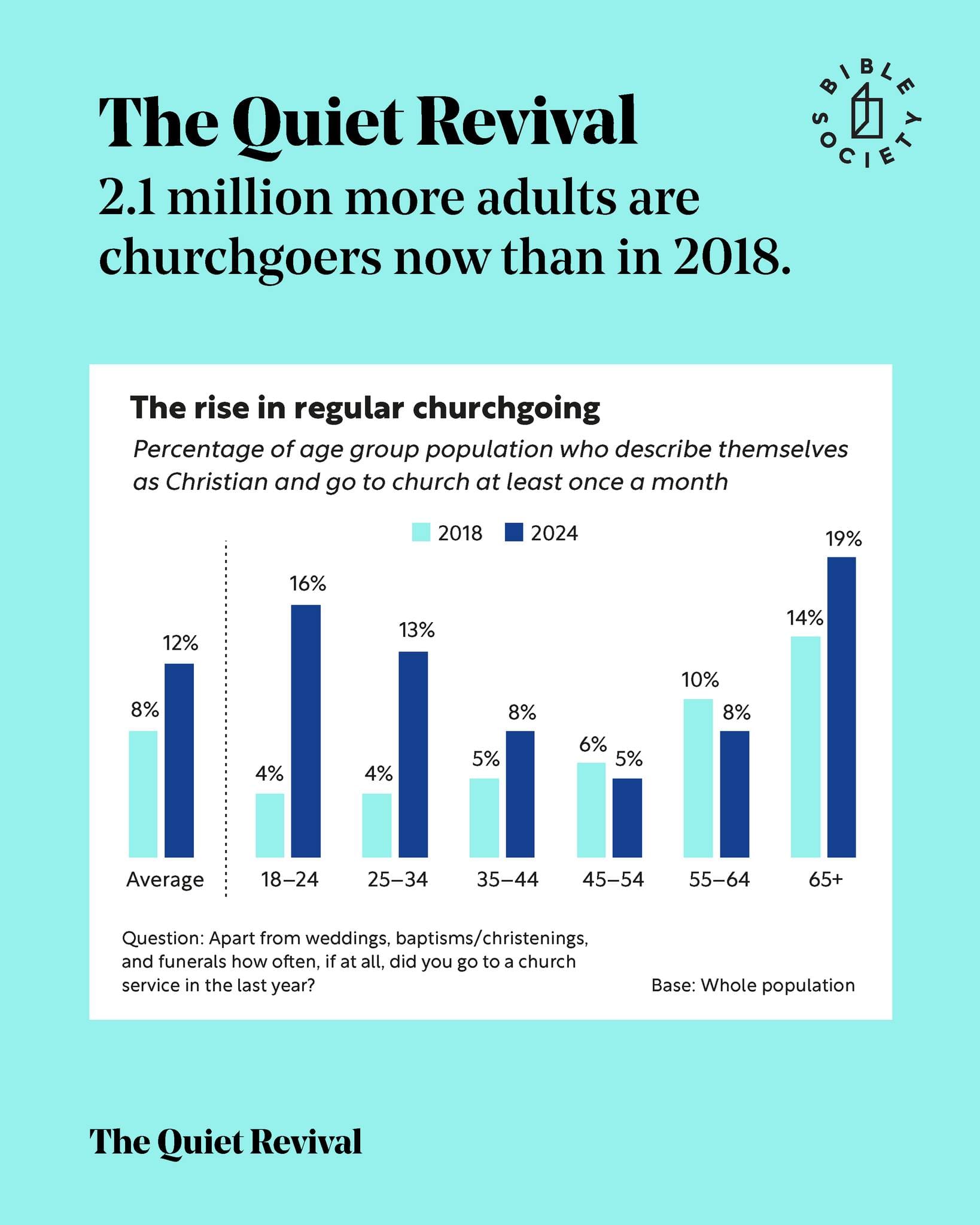

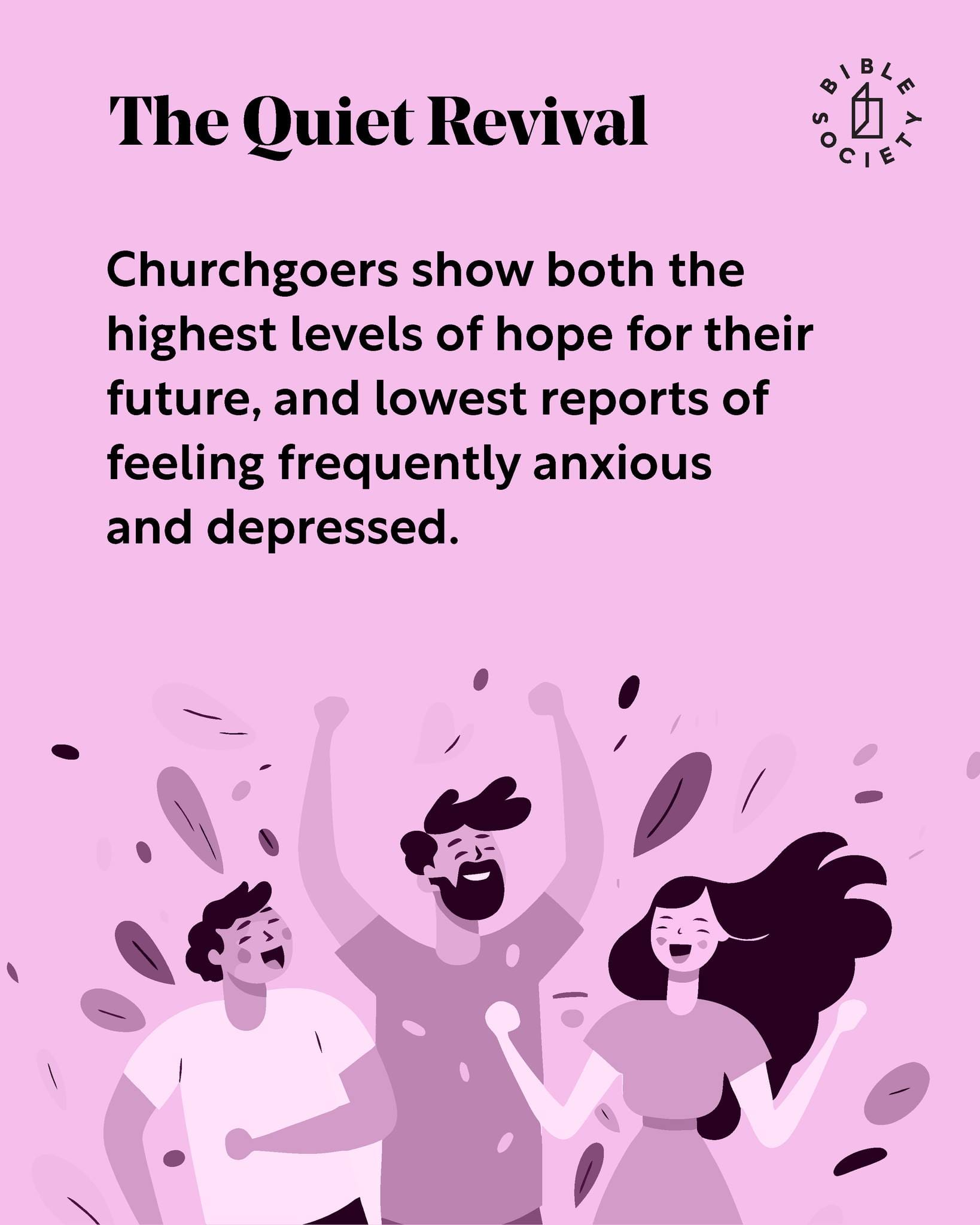
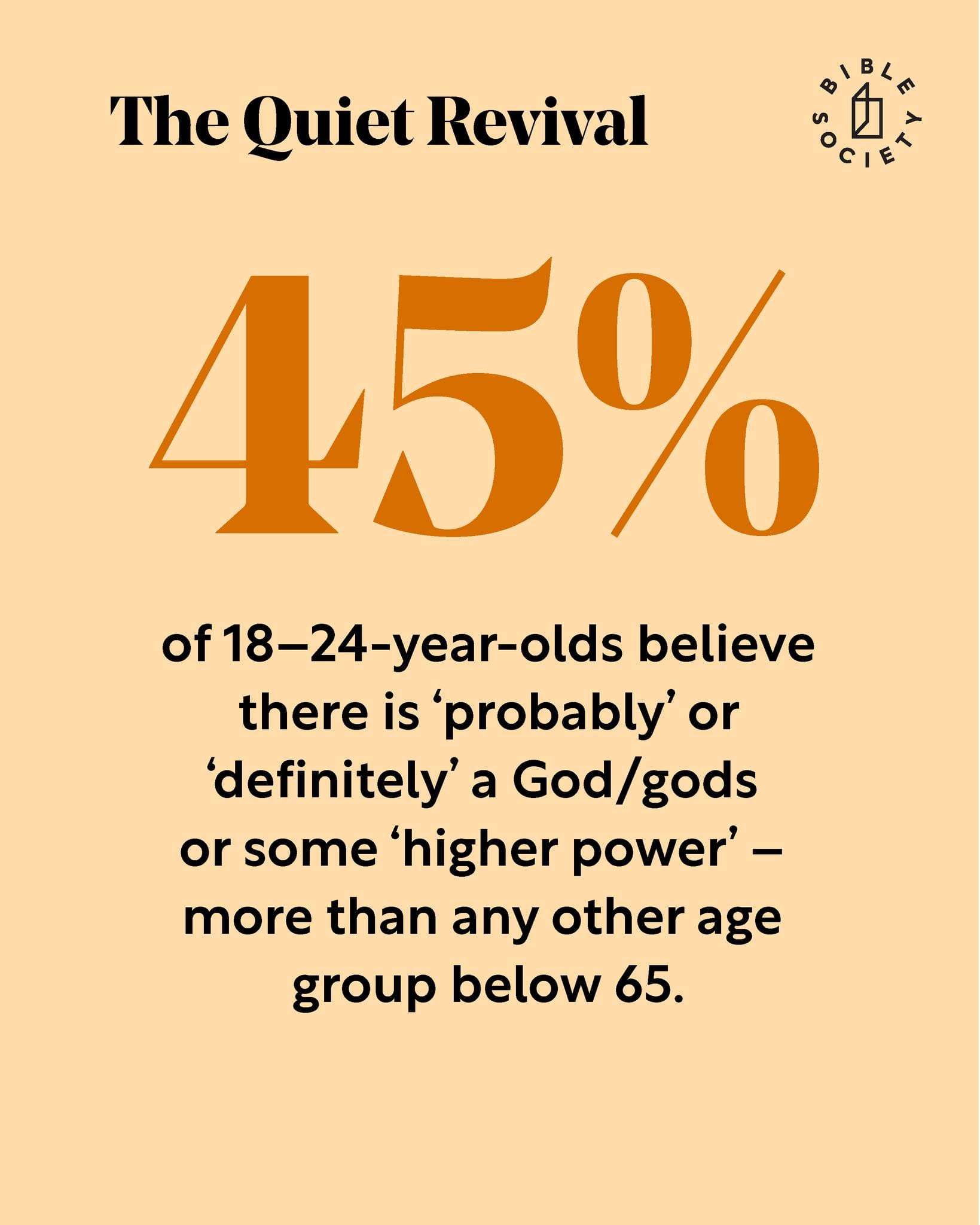
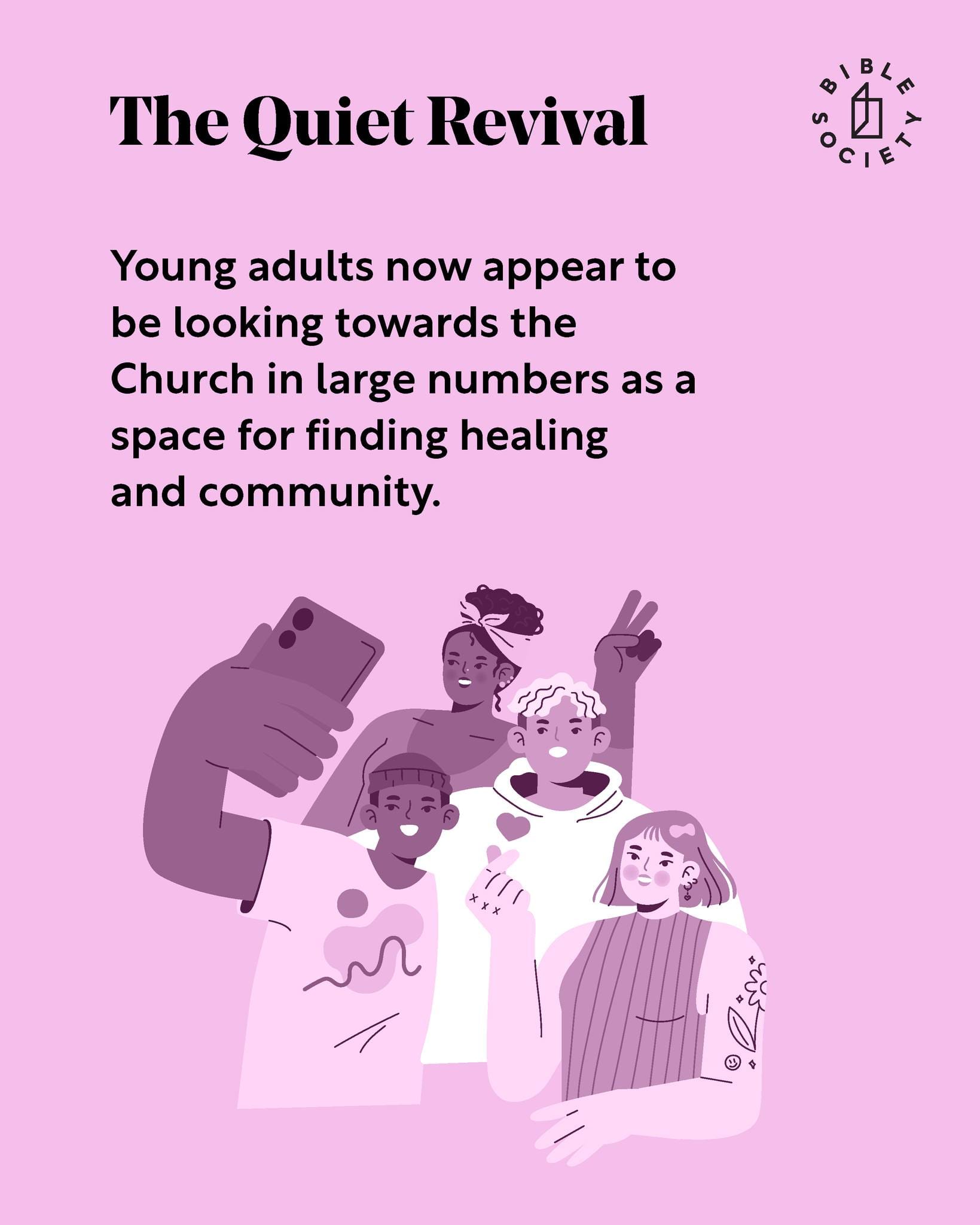
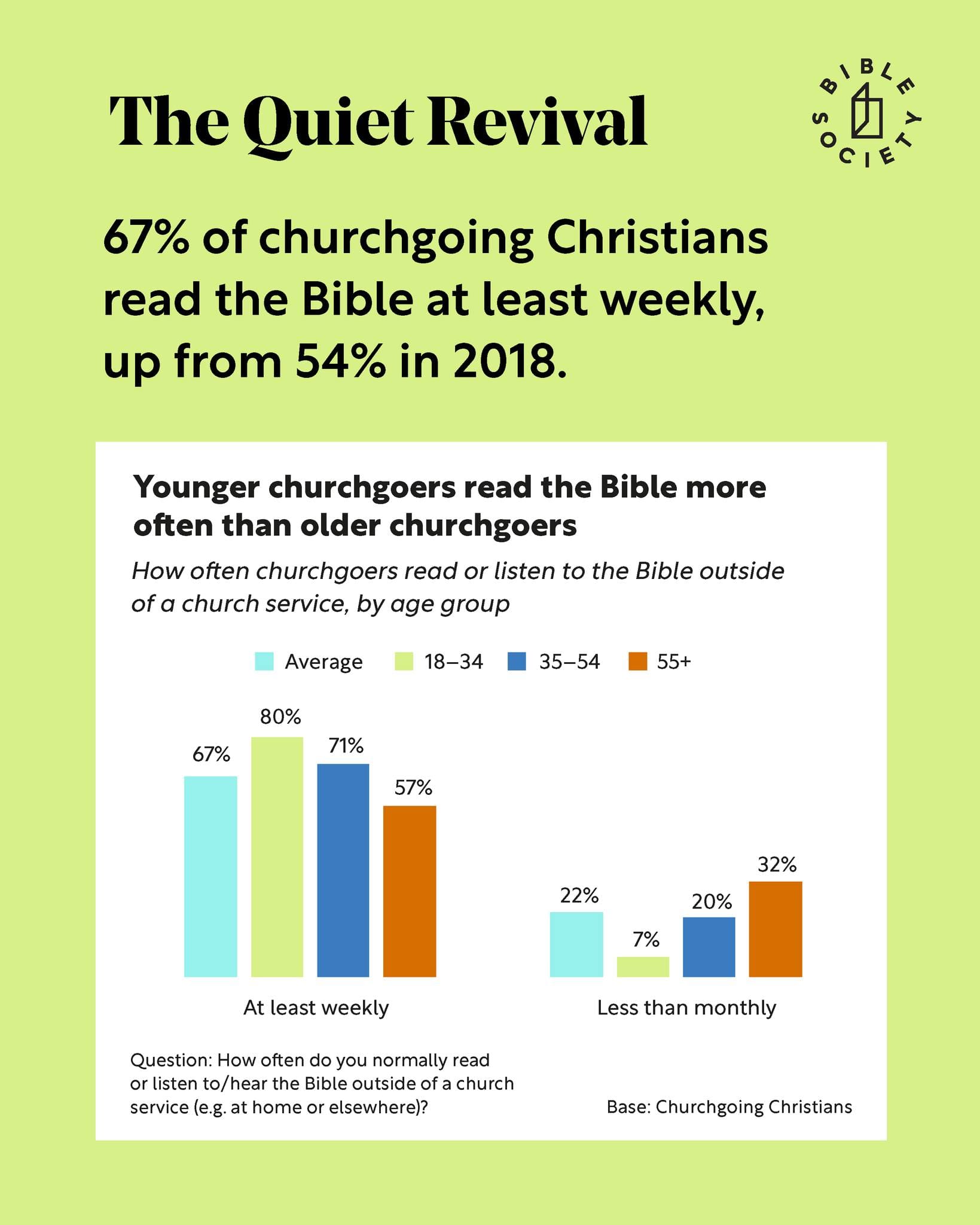
But how About Some Quiet Caution?
Unsurprisingly, there has been a whole spectrum of responses to this report. I think for many Christians and church leaders, it feels very encouraging. And I think part of that is because the stats do seem to be capturing something that for many resonates with their experiences of a gentle but distinct shift in the numbers of people engaging with church events and services. It's not that the Quiet Revival is telling us something positive that totally flies in the face of our experience; on the contrary, it seems to 'kind of fit' a subtle but stated direction of travel.
However, some have offered a little more scepticism - or at least caution. I think part of that is due to the use of the 'R-word', which perhaps inevitably when deployed seems to be making concrete claims of spiritual impact. Of course, it's also a word with a lot of connotations.
Paul Williams, CEO at Bible Society, carefully acknowledged this in the report's foreword:
‘The word ‘revival’ is freighted, particularly among Christians from the evangelical tradition, with folk memories of full-to-bursting congregations and dramatically emotional congregational experiences. This is not necessarily that. Our ‘Quiet Revival’ is low key, but it is widespread. It doesn’t draw attention to a particular leadership style, or way of doing church, or political influence. Instead, the story told in this report is revolutionary in terms of the public assumptions about Christianity in England and Wales, and transformational in terms of how Christians think about themselves.
Yet cautiousness remains. For example, Graham Tomlin, Director of the Centre for Cultural Witness and former Bishop of Kensington, calls for a pinch of salt. He says:
‘Revival’ is perhaps too ambitious a word to use right now. It would need a lot more hard evidence from bigger surveys and more observable results to deserve such a designation. But there do seem to be straws blowing in the wind, perhaps the first signs of a refreshing breeze which might yet sweep away some of the shadows of sceptical unbelief.
Others have also asked important questions about the way the survey was conducted. For example, Tim Wyatt notes that the definition of 'churchgoer', as anyone who attends church at least once a month, could conceivably be interpreted quite broadly. For example, if you attended a church toddler group or a some other event, you might still therefore 'count yourself in'. So is that legitimate?
Digging into the Methodology
Now, digging a little deeper, yes, there are some helpful factors to clarify in the way this survey was done. Ian Paul explores some of the questions raised around methodology in his interview with Dr Rhiannon McAleer from Bible Society, below. But before we get into the details, it's striking that Bible Society themselves seem to be surprised by the results - and have had a lot of back and forth with YouGov seeking to check their working.
For starters, the survey relies on 'self-reporting'. In other words, people get to answer about their own practice. In theory, church attendance could therefore be fabricated, exaggerated, etc, by the individual taking part. But as McAleer says, the survey is chiefly revealing people's attitudes. Self-reporting shows what people are comfortable acknowledging or expressing. So even with the potential for 'aspirational' responses, these still indicate a trend of increased willingness to identify as attending a church. That's still something to note.
And, yes, all surveys have limits. Of course, for example, people can 'uplift' their church attendance. But because Bible Society's data is comparative against the same survey done in 2018, even with some assumed 'uplift', you've got to factor that in for both surveys - and that still leaves you having to grapple with such a sharp increase from 2018 to 2024.
As well, it's fair to note that self-reported church-going doesn't equate to genuine Christian faith. However, the holistic emphasis in this data would suggest that although the 2021 national census revealed a sharp decrease in those identifying as Christian (46.2% in 2021, compared to 59.3% in 2011), the number within that 'self-identifying Christian' bucket who actually have an active faith does seem to have increased. In other words, as Glen Scrivener puts it, 'nominalism is dying'.
Another factor to consider in the report, as John Stevens notes, is that currently there is a net migration rate of 728,000 people per year to the United Kingdom. He concludes, "the large rises in the number of Catholics and Pentecostals are almost certainly a result of migration from Africa and elsewhere, bolstering the number of church attenders." Yes, to some extent, the increase of 2 million in the UK population in the last six years could be mapped onto the increase in church attendance. But that probably doesn't quite overlap with the emphasis on church-going amongst those aged 18-24, which came out so strongly in the data.
Where do we go from here?
Whilst some of us might be instinctively sceptical and others might be instinctively ecstatic, we can all heed the ageless call to be discerning.
This data does seem to capture a 'vibe shift' - as Wyatt puts it, "the cultural zeitgeist is shifting" - and certainly many Christians and churches are offering 'anecdata' that matches this. As well as being dependent on the sovereign grace of God, it would seems that this shift is absolutely connected to our cultural moment, as Stevens perceives:
"From a human perspective, a major factor seems to be the desire to find real hope and meaning. Secular liberalism hasn’t delivered the happiness and freedom it promised, and loneliness and mental health issues are ever-increasing. Young people bear the impossible burden of defining their own identity, and young men are tired of the relentless castigating of so-called toxic masculinity. Some pressures that have led to a rise in populist policies and alt-right influencers are also causing people to turn to the church for answers to their pain and frustration."
But, certainly, given that many of us are quick to declare how reports of church decline don't make the Christian faith any less true, perhaps we should be careful not to act as if reported church growth somehow now makes Christianity any more true.
As Tomlin concludes, "I've never taken the predictions of the church's demise too seriously. Which is why I'm not one for putting out the bunting when the predictions go the other way." That's a fair note of wisdom that helps us make sure our confidence isn't resting on the 'swinging mood of public opinion'.
What Next?
All in all, my take is that there’s plenty here to be encouraged by - and a fair bit to chew over too. My intention is to explore some of the 'take home' implications for Christians and churches in a future post.
Yes, it's probably right that we stay fairly level-headed. A few green shoots don’t make a forest. But something feels like it's shifting - and it's not just the British weather. So let's get watering! Let's not be so busy shrugging our shoulders that we miss what God is doing, or, at the very least, miss the opportunities seemingly opening up in British culture. If God is breathing fresh life into dry bones, even quietly, then that’s not something to critique from the sidelines.
So let's be faithful, prayerful, expectant hope-timists, for our confidence has never rested in statistics, but in a risen Saviour who loves to do more than we ask or imagine.
Whatever’s coming next, the gospel is still good news, Jesus is still alive, the Spirit is at work, and therefore the Church is still in business.